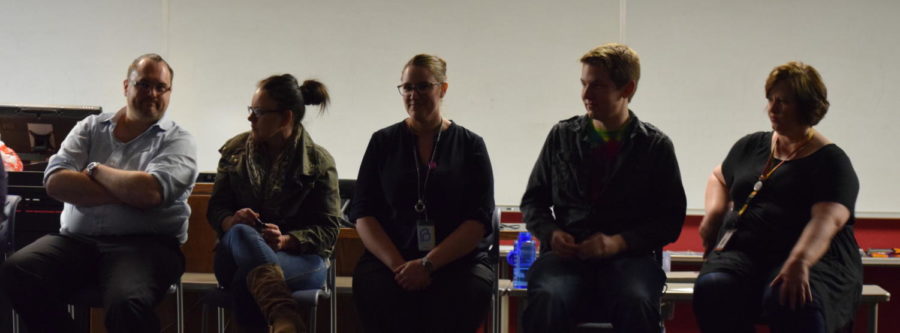In the dark sheds light on intimacy
Abigail Schafer/Iowa State Daily
After the Q & A period at Intimacy in the Dark had ended, lights turned on for students to approach the five panel members to further discuss resources. The panel members included representatives from Planned Parenthood, Thielen Health Center, and other area resources.
April 12, 2017
Room 205 of Carver was pitch dark on Wednesday night. Those who attended the Intimacy in the Dark event could not be seen, but their murmurs of conversation lingered. Before walking into the room, participants were handed a note card and rules that stated:
- No outing identities, partners or names
- Use “I” statements: speak from your experience and beliefs
- Give respect to get respect
- Assume good intentions. We are all here to support each other
- Keep an open mind.
As one of the events of Pride Week, Intimacy in the Dark was hosted to open up conversation about whatever intimacy might be for students. While the room was dark, it was filled with questions students could ask on a note card and place at the end of their table.
The panel that discussed the questions included Lois Smith, staff nurse at Thielen Student Health Center; Paul Hengesteg, graduate in education; Brian Vanderheyden; Student Wellness manager; Amy Popillion, senior lecturer in human development and family studies; Elizabeth Wolfe, health educator at Planned Parenthood; and Aaron Kirch, freshman in mechanical engineering and future president of Cuffs.
Where do I get free sexually transmitted infection (STI) testing?
Smith explained that a few of the testings can come free, while others such as HIV testing require payment or insurance. Wolfe said their payment plan ranges.
Is there any side effects in PrEP?
PrEP, Pre-Exposure Prophylaxis, is a daily medication that someone can take if they are in a high risk category for contracting or spreading HIV. Hengisted told about when he first started taking PrEP.
“The first day I felt nauseous and felt off in my own self,” Hengesteg said.
While PrEP is effective, Wolfe reminded students that they had to protect from other STIs so they should use other forms of protection.
What should you do if you have a kinky partner but you don’t know how to start?
“Negotiate,” Kirch said. “The best way to have a healthy relationship of any kind is conversation. I would encourage you just to have a discussion with your partner. See what they like.”
He suggested light bondage with scarves so you don’t need to have a safe word and you can break out of the bondage. Kirch suggested safe words such as “red” for stop or “yellow” for slow down.
Popillion suggested a “yes, no, maybe” list where partners create lists of what they would be interested in, what they would try and what they definitely won’t participate in. She recommended partners do it separately first and then come together to discuss their results.
How do you tell someone you’re not interested in a kink when you’re in a relationship with them?
“You have to be honest there because you don’t want to be in something that you’re not comfortable with,” Kirch said. “Focus on your discomfort with it instead of judging the other person for it.”
He used the example of using “I” statements so the partner still feels valued. But Popillion mentioned that the earlier partners talk about their interests and deal breakers, the easier it is later in the relationship when people are being intimate.
What kind of lubricants should I use for my first time participating in anal sex?
Kirch explained that silicone-based lubricants are good for not using toys, while water-based are good with toys. If one uses silicone-based lubricant with silicone toys, it will destroy the toy. Oil-based lubricants can absorb in one’s body and make them sick.
Who can I talk to about my negative view of my body image?
Vanderheyden suggested going to the Student Counseling Center, which offers talking in a group session or a one-on-one. If students go from 8 a.m. to 3 p.m., they can talk to someone that day.
He also suggested various peer groups on campus that educate on and support body awareness such as BIEDA, Iowa State’s Body Image and Eating Disorder Awareness club.
When does sex turn into love making?
“We have this perception in society that [love and sex] go hand in hand, but you don’t have to feel like they have to [go hand in hand],” Kirch said.
Popillion said she has been with her partner for more than 20 years. She explained that there are different types of sex that they want to have. Sometimes sex might be from a level of bonding and other times it might be from sexual desire.
How do I bring up friends with benefits with someone I’m interested in?
“Be open for communication and be prepared for rejection,” Kirch said. “It could be a roadblock for your friendship so be prepared for that.”
Hengesteg chimed in that partners really need to talk about the future of the decision of friends with benefits. When that communication is happening, one needs to be ready for it to go how they didn’t want it to.
















